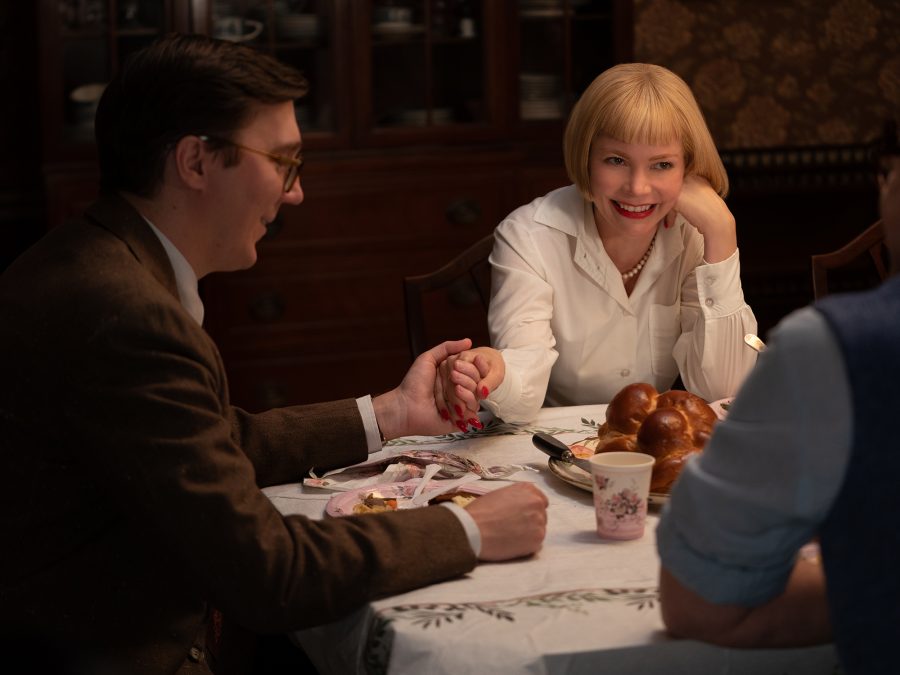Once he was American theatre’s leading light, now he’s Steven Spielberg’s valued collaborator, though Tony Kushner says, ‘I still think of myself as a playwright rather than a screenwriter’. The phantasmagorical AIDS-era six-hour theatrical epic, ‘Angels in America’, brought him a 1993 Pulitzer Prize, a wave of acclaim and placed him into Spielberg’s sightlines.
He came on board as co-writer of 2005’s Munich, and also wrote 2012’s Lincoln and 2021’s West Side Story. Their latest venture however, is a genuine mould-breaker within the Spielberg oeuvre, an accessible, ruminative and affecting jointly-authored original titled The Fabelmans, which lightly fictionalises Spielberg’s whizz-kid youth as a tyro amateur moviemaker while his parents marriage is on the brink of dissolution.
LWLies: There’s no historical context for this essentially domestic story, no genre trappings – it’s all about character and it’s Spielberg’s own story. Was that daunting for him?
Kushner: Let me take you back to the shoot for Lincoln. Sally Field was nervous because the first scene she was going to do was the stand-up argument with Daniel’s Lincoln about the risks of him letting their son join General Grant’s military staff. If anything, Steven was even more anxious about the scene, because he’d never actually shot anything with a real married couple truly going at it.
I’ll never forget that he said to me at the time, ‘It’s like my mom and dad battling it out when we were in northern California. It’s upsetting to me, I’ve been dreading this scene.’ And, of course, he did it fantastically. I’ve learned over the years that unless Steven is scared of the complexity or scale of something he’s taking on, he doesn’t feel he’s doing his job properly. Actually, he told me there are a couple of his movies that he did because he was expected to do them, where he didn’t have that gut feeling, ‘What if I can’t pull this off?’.
And was that amplified in the case of The Fabelmans?
You know, Steven loves Scenes from a Marriage, he loves a good Bergman film, but he just wondered if this kind of film was within his particular wheelhouse. Then when Michelle Williams turned up on set, in full costume and make-up with her hair done, that was a whole other thing. She was the image of his late mother. It was amazing. Steven was crying. His sisters were in tears. He found it tough to get through the scenes that day.

Did you have to at all persuade Spielberg to put himself through all this?
When we were writing the script, we talked a lot about Eugene O’Neill. The greatest autobiographical play of the 20th century is ‘Long Day’s Journey into Night’. He put himself through hell writing it. He finished it in 1939, locked it away in a vault, and stipulated that it could only be read – and not performed! – 25 years after his death. He just couldn’t deal with the prospect of any actress playing his drug addicted mother.
That was a reference point for myself and Steven, and I mention it because of what happened when we were filming the scene with his mother dancing by the car headlights at night in the campsite. He’d shot all night looking from the perspective of the two men, the husband and the family friend, but then Steven turned the camera round to capture her shadow falling across their faces as they watched, entranced. I sent him a text afterwards to say just how much that reminded me of O’Neill’s extraordinary final scene, where Mary Tyrone the mother, descends the staircase, and her husband and sons are at last rendered silent by the power of this female presence.
What would your younger self say about the fact you’ve ended up working largely in cinema for Spielberg?
I don’t think he’d quite believe it. My older self still has to pinch himself too sometimes. But you go back to the first half of Angels in America, where this young guy has AIDS and he’s getting all these hallucinations. The bed is moving, the light’s changing colour, there’s a huge crack in the ceiling, just before the Angel’s first appearance. His line is ‘Very Steven Spielberg!’ – only in the theatre, since Mike Nichols took it out of the TV version – and it’s not totally sarcastic either. Still my favourite Spielberg film is Close Encounters, which had a huge influence on me, because it builds to this finale where you’re not sure whether it’s the day of salvation or the day of wrath. I took that on and wrapped it in pre-millennial anxiety when writing Angels in America.
And have you managed to bring that same personal creative imprint into the writing of screenplays for Spielberg?
We’ve been working together for nineteen years. I shout and scream and he listens. Would I have written four great plays in that time if I hadn’t been doing this stuff. Maybe, but I also know I’m really proud of that part of his oeuvre that he’s invited me into. Sometimes you meet somebody who’s a kind of soulmate. I couldn’t collaborate with anyone who doesn’t have a profound love affair with the American democratic experiment, a recognition of its failings but also of its radical possibilities. And we’re working on a fifth movie together…
The post Tony Kushner: ‘Close Encounters had a huge influence on me’ appeared first on Little White Lies.
from Little White Lies https://ift.tt/BNzEsXV
via IFTTT

0 Comments